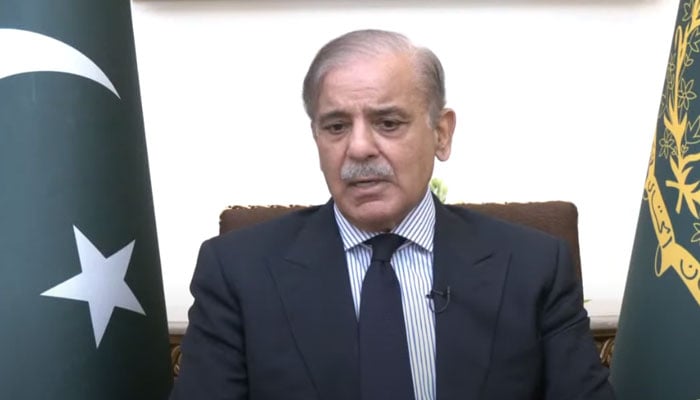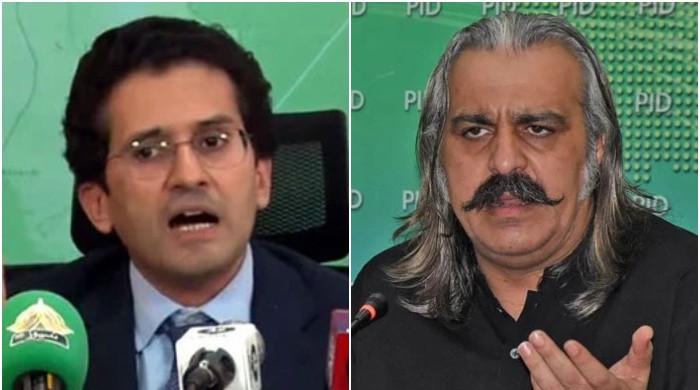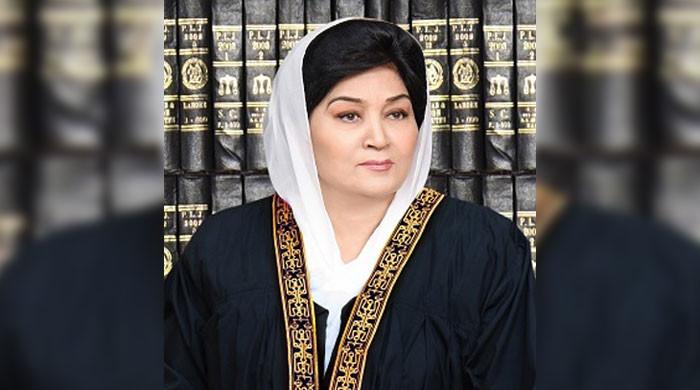PM Shehbaz says top court’s verdict on review law not to affect Nawaz's homecoming
"Law says maximum period for disqualification is 5 years, Nawaz will return as verdict will not be a hurdle," says premier
August 11, 2023

- Nawaz Sharif’s return not linked with SC decision, says PM.
- Premier Shehbaz is disappointed with timing of the verdict.
- Regrets that verdict was passed after parliament's dissolution.
Prime Minister Shehbaz Sharif on Friday regretted the timing of the top court’s verdict on the Supreme Court (Review of Judgments and Orders) Act 2023 and assured that the ruling would not affect Pakistan Muslim League-Nawaz (PML-N) supremo Nawaz Sharif’s plans to return to Pakistan.
“As far as Nawaz Sharif’s return is concerned the [SC] decision has no link with it,” the premier said during an interview with state-run TV channel PTV. He added that his elder brother, the three-time prime minister, has completed the five-year disqualification period.
“The law which is in the field right now states that the maximum period for disqualification is five years. Nawaz Sharif will return and this verdict will not be an obstruction,” the incumbent PM said.
A day earlier, Premier Shehbaz had said that Nawaz would return to the country next month and face the law.
The development comes as the nation is heading towards general elections.
In an interview with Geo News’ Capital Talk programme, the outgoing premier said he would travel to London to meet his elder brother Nawaz as soon as the caretaker government takes charge.
“Nawaz Sharif will come back to Pakistan next month and will face the law and lead the election campaign,” PM Shehbaz said without giving the exact date of Nawaz’s homecoming who has been in self-imposed exile in London since November 2019 owing to health reasons.
The way for Nawaz’s return was also paved with the signing of the bill seeking amendments to Section 232 (Qualifications and Disqualifications) of the Election Act, 2017 by Interim President Sadiq Sanjarani in June.
Nawaz Sharif and Istihkam-e-Pakistan Party (IPP) chief Jahangir Khan Tareen are among those who benefited from the move.
The Supreme Court disqualified both senior politicians for life in June and December 2017, respectively, after they were found to be "dishonest" under Article 62(1)(f) of the Constitution.
PM regrets timing of verdict
During today’s interview with PTV, Premier Shehbaz also regretted the timing of the verdict of the Supreme Court (Review of Judgments and Orders) Act 2023.
“I am really disappointed that the decision came when parliament was dissolved after completing its tenure. I wish the verdict had come during the parliament's life then we would have debated this law on the floor or the house or made amendments with the parliament’s collective wisdom.”
The prime minister added that he “personally felt disappointed” with the timing of the verdict.
SC rules judgments review law unconstitutional
Earlier today, in a unanimous verdict, the apex court ruled that the Supreme Court (Review of Judgments and Orders) Act 2023 was "unconstitutional" a move seen by many as dampening the hopes of Nawaz and Tareen who were seeking to challenge their lifetime disqualifications.
Both Nawaz and Tareen were disqualified under Article 62 of the Constitution by the apex court. Had the verdict today been in favour of the petitions, both leaders would have gotten an opportunity to challenge their disqualifications, keeping in view their political ambitions amid the upcoming general elections in the country following the completion of the tenure of the National Assembly.
A three-member bench of the apex court headed by Chief Justice Umar Ata Bandial and comprising Justice Ijazul Ahsan and Justice Munib Akhtar had heard multiple petitions challenging the law, enacted in late May.
Ghulam Mohiuddin, Zaman Khan Vardak, the Jurists Foundation, through its CEO Riaz Hanif Rahi, and the Pakistan Tehreek-e-Insaf (PTI) had challenged the vires of the act.
Attorney General for Pakistan (AGP) Mansoor Usman Awan had asked the court — during earlier hearings of the case — to dismiss the pleas, explaining that it broadens the court's jurisdiction and does not curb its powers.
However, PTI lawyer Ali Zafar, on behalf of the party's Secretary General Omar Ayub, had maintained that a change in the apex's powers could not be made through legislation alone and required a constitutional amendment.
On June 19 after six hearings — from June 7 to June 19 — the bench reserved its verdict.
The CJP today read out the decision in the presence of the AGP, petitioners, and a large number of lawyers.
"The Supreme Court Review Act is against the Constitution," CJP Bandial said, adding that the verdict was passed unanimously.
The detailed 87-page long order struck down the law as null and void and of no legal consequence.
It said the Act is "repugnant to and ultra vires the Constitution [...] being beyond the legislative competence of the Parliament."











